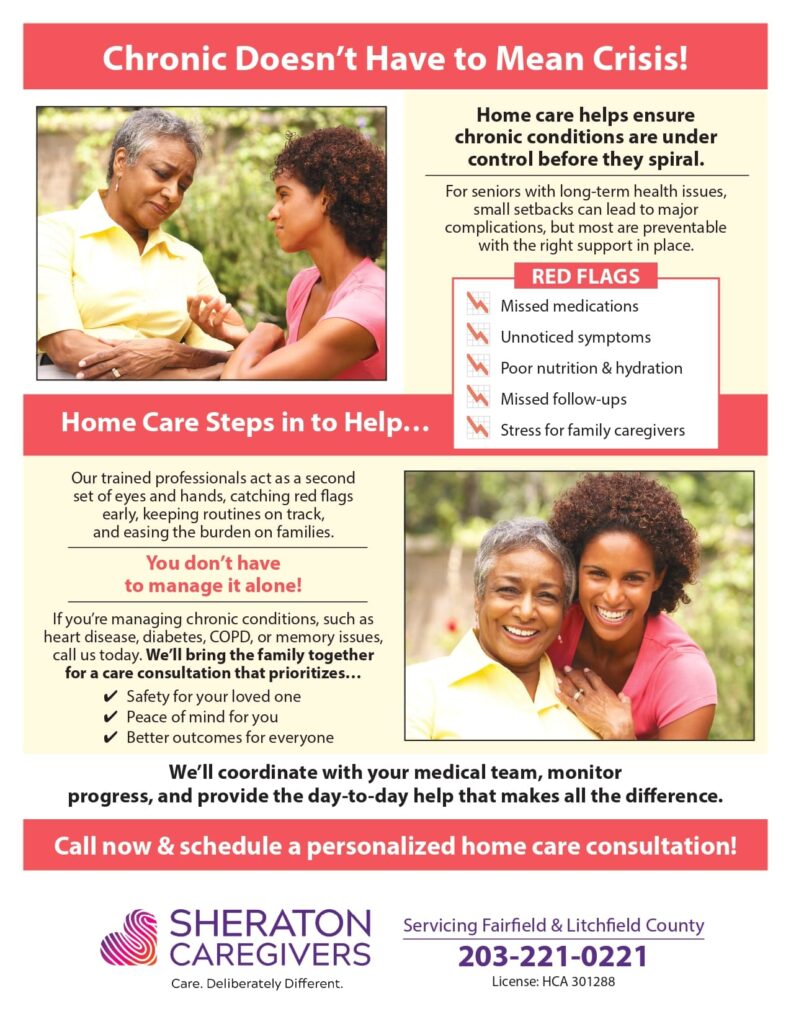TLDR
A practical, compassionate guide for family caregivers of people with chronic conditions — explains what chronic illnesses are, how they affect daily life, the benefits of consistent, thoughtful care, common caregiver challenges (burnout, complex meds, cost, emotional strain), and easy, actionable steps to help (create a care plan, use tech, adapt the home, seek professional and community support). Sheraton Care is offered as a resource to lighten the load and help loved ones live safely and with dignity.
Caring for Someone With Chronic Conditions
Have you ever found yourself wondering how to best support a loved one dealing with ongoing health issues? You’re not alone. Caring for someone with a chronic condition can feel overwhelming some days and incredibly rewarding on others. It’s a journey filled with learning, small victories, and plenty of love.
That’s why understanding the essentials of chronic conditions care matters. When you know what it involves, why it’s important, and the challenges you might face, everything feels a little less intimidating. In this guide, we’ll walk through it together and share practical strategies to help your loved one get the care and support they deserve.
What Are Chronic Conditions and How Do They Affect Daily Life?
Chronic conditions are health issues that persist over time and often require ongoing medical attention. They can make everyday activities more challenging. Common examples include diabetes, heart disease, arthritis, Alzheimer’s, and chronic respiratory illnesses.
You might be surprised how common they are. Six out of ten adults in the U.S. live with at least one chronic disease, and four out of ten manage two or more (CDC, 2023). These conditions are also among the leading causes of death and disability, which is why thoughtful, consistent care is so important.
But chronic conditions care isn’t just about medical appointments or medications. It’s about helping your loved one maintain quality of life, independence, and dignity every single day.
Take John, for instance. He’s 72 and living with both diabetes and heart disease. His care plan isn’t just medication, it includes regular check-ups, a tailored diet, daily exercise, and ongoing family support. By combining these strategies, John is able to manage his conditions while still enjoying life.
Think about it for a moment: what small changes could you make today to support your loved one’s daily routine? Even tiny adjustments can make a real difference.
How Families Can Support Loved Ones Every Day
Caring for someone with chronic conditions can look different depending on their needs. Here are some ways families can step in:
- Medical Management – Keeping track of symptoms, medications, and appointments. It might feel like a lot, but having a clear system can make things manageable.
- Lifestyle Support – Encouraging healthy eating, regular exercise, and stress-reducing activities. These habits can slow disease progression and improve overall well-being.
- Daily Living Assistance – Helping with cooking, bathing, or moving safely around the home. Even small daily support tasks can make a big difference.
- Emotional and Mental Health Support – Chronic illness can affect mood and mental health. Companionship, counseling, or just checking in regularly can lift spirits and reduce loneliness.
- Technology and Remote Care – Glucose monitors, wearable heart trackers, and telehealth visits make managing conditions from home easier and less stressful.
Which of these areas do you think your loved one could use the most support in right now? Identifying the priorities makes planning care much simpler.
How Thoughtful Care Can Change Lives
Providing consistent care has clear benefits for both your loved one and your family:
- Better Health Outcomes – Structured care can reduce hospital visits and emergencies.
- Improved Quality of Life – Seniors can maintain independence and keep enjoying the routines they love.
- Less Stress for Families – A clear plan and professional support lighten the caregiving load.
- Cost Savings – Preventive care and early interventions often reduce expensive medical emergencies.
Seeing these benefits in action can be motivating. Even small daily efforts add up to significant improvements over time.
Challenges Families May Face
Even with the best intentions, caregiving can be tough:Caregiver Burnout – Millions of Americans provide unpaid care, which can take an emotional and physical toll (National Alliance for Caregiving).
- Complex Medication Schedules – Managing multiple prescriptions can be confusing and risky.
- Financial Pressure – Chronic conditions can be costly, even with insurance coverage.
- Emotional Strain – Watching a loved one struggle with health issues can be emotionally and mentally draining.
Have you noticed any of these challenges in your own caregiving experience? Recognizing them is the first step to finding solutions.
Practical Ways to Make Care Easier
There are many strategies to help families manage care effectively:
- Create a Care Plan – Work with healthcare providers to set up routines for medications, diet, exercise, and appointments.
- Use Technology – Apps like Medisafe help track medications, and telehealth lets you consult doctors from home.
- Make Home Adjustments – Grab bars, ramps, and non-slip flooring can make daily life safer.
- Seek Professional Help – In-home care or nursing support can fill gaps when family support isn’t enough.
- Join Support Networks – Organizations like the American Heart Association Support Network or Alzheimer’s Association offer advice, guidance, and community.
Implementing just one of these strategies can lighten your load and improve your loved one’s day-to-day life.
Helping Loved Ones Live Fully With Chronic Conditions
Caring for someone with long-term health needs is never easy. But with thoughtful care for chronic conditions, families can make a real difference. Combining medical management, healthy lifestyle habits, emotional support, and professional guidance helps seniors maintain comfort, independence, and dignity.
The best part? You don’t have to do it alone. Sheraton Care can provide compassionate expertise to support both seniors and the families who care for them. With the right resources and a clear care plan, chronic conditions don’t have to define life, they can be managed so your loved ones can continue living fully, meaningfully, and safely.


